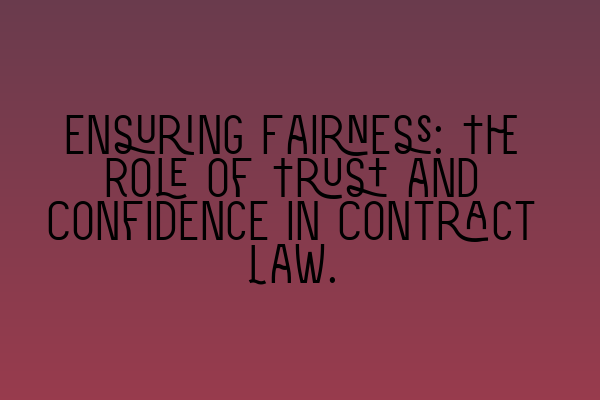Ensuring Fairness: The Role of Trust and Confidence in Contract Law
Welcome to the SQE Contract Law blog, where we delve into the intricacies of contract law and its significance in ensuring fairness and justice. In this article, we will explore the essential role that trust and confidence play in contract law, and how they contribute to the fair resolution of disputes. Understanding these concepts is crucial for legal professionals, as they form the foundation of contract formation and enforcement.
Defining Trust and Confidence
Trust and confidence are pivotal principles in contract law. They refer to the faith and reliance parties place in one another during the formation and performance of a contract. When two or more parties enter into a contract, they must have trust and confidence that the other party will uphold their obligations and act in good faith.
Trust, in contract law, emphasizes the expectation that parties will fulfill their promises and act honestly. It ensures that individuals can engage in contractual relationships with the confidence that their rights and interests will be protected.
Confidence, on the other hand, emphasizes the expectation that parties will not take advantage of their position or exploit the vulnerabilities of the other party. Confidence ensures that parties can enter into contracts without fear of being unfairly disadvantaged.
Trust and Confidence in Contract Formation
When two parties negotiate and enter into a contract, trust and confidence are paramount in ensuring a fair agreement. Parties must trust that the other party is providing accurate and complete information, without any hidden or misleading terms. This trust forms the basis for a mutually beneficial agreement that protects the rights and interests of both parties.
During the negotiation process, trust and confidence allow parties to work towards common goals, seeking compromise and finding mutually acceptable terms. Each party must have confidence that the other party will act honestly and in good faith during the negotiations.
To further enhance trust and confidence during contract formation, it is essential to clearly communicate the terms of the agreement, ensuring that there is no ambiguity or misunderstanding. Parties should seek legal advice to ensure they fully understand the contract’s implications and the rights and obligations they will be bound by.
If you are preparing for the SQE 1 exam and would like to practice contract law-related questions, check out our SQE 1 Practice Exam Questions.
Trust and Confidence in Contract Performance
The principles of trust and confidence extend beyond contract formation. Once parties have entered into an agreement, they rely on trust and confidence to ensure the contract is performed as intended. Trust compels parties to fulfill their promises, while confidence prevents parties from taking advantage of their position or engaging in unfair practices.
In cases where one party fails to perform their obligations, trust and confidence are crucial in resolving disputes. The injured party must have confidence that the legal system will fairly address their grievances and enforce the contract’s terms. Trust in the judiciary’s ability to dispense justice ensures parties are willing to resort to legal remedies when necessary.
If you are preparing for the SQE 2 exam and need assistance with contract law, consider enrolling in our SQE 2 Preparation Courses. Our expert tutors will provide comprehensive guidance to help you succeed in your SQE journey.
Conclusion
Trust and confidence are foundational principles in contract law, playing a pivotal role in ensuring fairness and justice. Parties rely on these principles during contract formation and performance, allowing them to engage in agreements without fear of exploitation or unfair treatment. Understanding the importance of trust and confidence is essential for legal professionals, as they navigate the complexities of contract law and work towards equitable resolutions.
If you are interested in learning more about SQE preparation courses and exam dates, visit our website: SRA SQE Exam Dates. We offer comprehensive resources and expert guidance to help you excel in your SQE endeavors.
